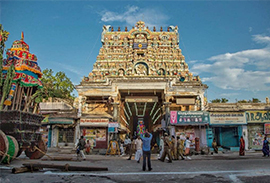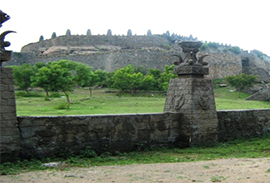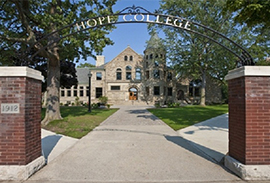Elysium Academy offers a comprehensive Full Stack Developer Certification program designed to equip you with essential frontend and backend development skills to become a proficient full stack developer. This course blends theoretical knowledge with hands-on projects, ensuring you master the latest technologies used in real-world applications.
Full Stack Developer
Definition and roles of a full stack developer:
A full stack developer is an expert capable of managing both the client-facing (frontend) and server-side (backend) aspects of web or application development. They design, build, and maintain complete web applications or software solutions from the user interface to the database and server logic.
Frontend vs backend development explained:
Frontend refers to everything the user interacts with directly — the layout, design, and user experience (using HTML, CSS, JavaScript, frameworks like React).
Backend involves the server, application logic, and databases — managing data flow, user authentication, and business rules (using Node.js, Express, databases like MySQL or MongoDB).
Why being full stack is valuable in the job market:
Full stack developers are highly sought after because they can handle end-to-end project development, reduce dependency on multiple specialists, and are flexible to work across different parts of a project, making teams more efficient.
Course Syllabus
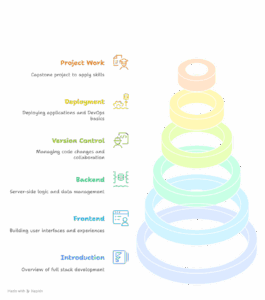
Introduction to Full Stack Development
Understanding the role of a full stack developer:
Learn what responsibilities full stack developers have and how they fit into the software development lifecycle.
Overview of frontend and backend development:
Gain clarity on how the frontend and backend components interact in a web application.
Fundamentals of web development:
An introduction to HTTP, HTML, CSS, and JavaScript, the core technologies behind building modern websites. Understand the foundational technologies and protocols that power web applications, including how browsers communicate with servers and how pages are structured and styled.
Frontend Development
HTML5 & CSS3: Semantic tags, layouts, styling, responsive design with media queries:
Learn to structure web content using semantic HTML elements, style with CSS, and make websites adaptable across devices through responsive design.
JavaScript (ES6+): Variables, functions, DOM manipulation, events, AJAX:
Master modern JavaScript features, how to dynamically update page content, handle user interactions, and communicate with servers asynchronously.
Advanced JavaScript Frameworks: Introduction to React.js / Angular / Vue.js:
Get hands-on with popular frontend frameworks/libraries that simplify building complex, interactive user interfaces.
Bootstrap & Material UI: Building responsive, modern user interfaces:
Use CSS frameworks and UI libraries to speed up design and ensure visually appealing, mobile-friendly layouts.
Backend Development
Node.js & Express.js: Setting up server-side applications, REST API creation:
Learn to build scalable backend applications and APIs that serve data to frontend apps.
Database Management:
SQL Databases (MySQL, PostgreSQL): Understand relational databases, how to design schemas, and perform CRUD (Create, Read, Update, Delete) operations.
NoSQL Databases (MongoDB): Learn document-based database concepts and how to work with flexible schemas.
Authentication & Security: JWT, OAuth, password hashing, session management:
Implement secure user authentication methods and protect applications from common vulnerabilities.
Version Control & Collaboration
Git and GitHub fundamentals:
Learn version control basics to track code changes and collaborate efficiently.
Branching, merging, pull requests, and collaboration workflow:
Learn advanced Git workflows that allow teams of developers to collaborate efficiently while avoiding code conflicts.
Deployment & DevOps Basics
Hosting applications on cloud platforms (AWS, Heroku):
Learn to deploy your applications to cloud servers so they are accessible on the internet.
Introduction to Docker containers and CI/CD pipelines:
Explore containerization for consistent development environments and automated pipelines for continuous integration and deployment.
Project Work & Capstone
Build a real-world full stack application integrating frontend and backend:
Apply all learned skills to create a complete, functional web application from scratch.
Hands-on experience with API integration, database operations, and deployment:
Gain practical experience with connecting frontend and backend, managing databases, and making your app live.
Code reviews and optimization:
Master essential coding standards by analyzing code quality and enhancing performance, readability, and long-term maintainability.
Why Choose Elysium Academy Full Stack Developer Certification?
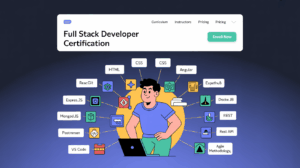
- Experienced Trainers
At Elysium Academy, our certification program is delivered by industry experts with years of real-world development and training experience. Learning from experienced trainers ensures you gain up-to-date knowledge and practical insights that other programs may lack. - Hands-On Learning
The full stack developer certification course focuses heavily on hands-on learning. You’ll work on practical projects and real-time assignments that simulate real work environments, helping you build strong technical skills that employers demand. - Placement Assistance
Our certification includes dedicated placement support. From resume building to interview preparation, we help you confidently face job interviews and increase your chances of securing a role as a full stack developer. - Flexible Learning Modes
Understanding diverse student needs, Elysium Academy offers flexible modes for the full stack developer certification course—both online and offline. This flexibility allows you to learn at your own pace without compromising your personal or professional commitments. - Industry-Recognized Certification
On successful completion of the full stack developer certification, you will receive a certificate recognized by the IT industry, which validates your skills and enhances your employability in competitive job markets.
Who Can Enroll in the Full Stack Developer Certification?
- Fresh Graduates
If you are a fresh graduate looking to start a career in web development, the developer certification from Elysium Academy will provide you with the necessary skills to stand out to employers. - Working Professionals
Professionals seeking to upskill or transition to a full stack developer role will benefit immensely from our full stack developer certification program’s comprehensive curriculum. - Entrepreneurs and Freelancers
Entrepreneurs and freelancers aiming to build complete web applications from start to finish can leverage the developer certification to learn both frontend and backend development effectively.
Tools and Technologies Covered in Certification
Enrolling in a full stack developer certification program gives you hands-on experience with some of the most in-demand tools and technologies used in the industry. Here are the key ones:
- VS Code (Visual Studio Code): The most popular code editor used by full stack developers for writing, debugging, and managing projects efficiently.
- Git & GitHub: Essential for version control and collaborative coding. You’ll learn how to track changes, manage branches, and handle merge conflicts like a pro.
- Postman: A powerful tool used to test APIs. As part of your full stack developer certification, you’ll regularly use Postman to debug backend endpoints and verify server responses.
- Docker: Learn the basics of containerization to deploy applications in consistent environments. Docker helps in building scalable applications—crucial knowledge for a certified full stack developer.
- MongoDB Compass / MySQL Workbench: Visual tools to interact with databases easily. Whether it’s SQL or NoSQL, you’ll understand how to handle database structures visually and via command line.
- Node.js & Express.js: Widely used in backend development, these technologies enable asynchronous, event-driven server-side scripting.
- React / Angular / Vue: You’ll get to use at least one modern JavaScript framework during your full stack developer certification to build dynamic and responsive user interfaces.
- Figma / Adobe XD (optional): Some tracks may expose you to UI/UX design basics for seamless frontend development.
By the end of your full stack developer certification, you’ll have mastered these tools, giving you the confidence to handle real-world web development projects independently.
Projects You’ll Build During the Full Stack Developer Certification
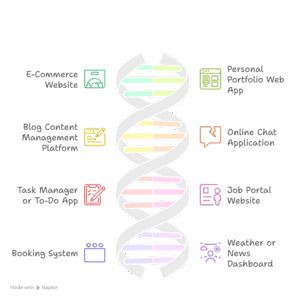
The full stack developer certification program isn’t just about theory—it’s built to give you real-world, hands-on experience through live projects. These projects will simulate industry-standard workflows, helping you apply your skills in practical scenarios.
Below are key projects you’ll typically build during the certification:
E-Commerce Website
One of the most popular projects in any full stack developer certification, this involves building a fully functional e-commerce platform. You’ll implement features such as product listings, shopping cart, payment integration, user authentication, and admin dashboards using technologies like React, Node.js, and MongoDB.
Personal Portfolio Web App
This project helps you build your own developer profile with sections like About, Skills, Projects, and Contact. You’ll host this using GitHub Pages or Netlify—demonstrating frontend skills acquired during your certification.
Blog Content Management Platform
You’ll create a CMS-like blog where users can sign up, write, edit, delete, and comment on articles. This project showcases full CRUD operations and API integration
Online Chat Application
Using Socket.io and Node.js, you’ll develop a real-time chat app. This project introduces WebSocket implementation and real-time communication, which are key competencies covered in the full stack developer certification.
Task Manager or To-Do App
You’ll design a multi-user task management system with signup/login features, allowing users to create, update, and delete tasks. It’s an excellent project to understand user roles.
Job Portal Website
Build a job board where users can register as recruiters or candidates, post and apply for jobs, and filter listings. This simulates a real-life web product and applies everything you learn in your full stack developer certification.
Booking System (Movie or Hotel)
This project involves seat selection, real-time availability checks, and booking confirmation emails. It’s a full-stack challenge that truly tests the backend logic and user interaction skills gained through your developer certification.
Weather or News Dashboard Using APIs
In this lightweight project, you’ll fetch live data from external APIs like OpenWeather or NewsAPI and display it dynamically. It emphasizes API handling and data rendering skills
By completing these real-time projects, you don’t just gain coding experience—you graduate with a portfolio that proves your readiness to employers. Each project solidifies your understanding of how front-end and back-end systems work together, preparing you to confidently enter the tech workforce after your full stack developer certification.
Career Opportunities After Full Stack Developer Certification
Full Stack Developer
Role:
A Full Stack Developer handles both frontend and backend development tasks to build complete web applications. They manage everything from designing the user interface to creating server-side logic and database management.
Responsibilities:
- Develop responsive user interfaces using HTML, CSS, JavaScript, and frameworks like React or Angular.
- Create and maintain backend services and APIs using Node.js, Express, or similar technologies.
- Manage databases (SQL and NoSQL) to store and retrieve data efficiently.
- Ensure seamless integration between frontend and backend components.
- Optimize application performance and implement security best practices.
- Collaborate with designers, product managers, and other developers to deliver high-quality software.
Frontend Developer
Role:
A Frontend Developer focuses on building the visual and interactive aspects of a website or application that users engage with directly.
Responsibilities:
- Translate UI/UX designs into functional web pages using HTML, CSS, and JavaScript.
- Use JavaScript frameworks such as React, Angular, or Vue.js to build dynamic interfaces.
- Ensure the application is responsive and works across different devices and browsers.
- Optimize user experience and application performance.
- Work closely with backend developers to integrate APIs and services.
Backend Developer
Role:
A Backend Developer designs and develops the server-side logic, databases, and application programming interfaces (APIs) that power the functionality behind the scenes.
Responsibilities:
- Build server-side applications using Node.js, Express, or other backend frameworks.
- Design and manage databases (MySQL, PostgreSQL, MongoDB) and ensure data integrity.
- Create secure RESTful APIs for frontend consumption.
- Implement authentication, authorization, and security measures.
- Handle server, application deployment, and maintenance tasks.
- Troubleshoot and debug backend issues to ensure smooth performance.
Web Application Developer
Role:
A Web Application Developer is responsible for developing applications that run on web browsers, combining both frontend and backend elements to create full-fledged software solutions.
Responsibilities:
- Develop scalable web applications tailored to user needs.
- Integrate frontend UI with backend services and databases.
- Optimize applications for speed and efficiency.
- Maintain and update applications based on user feedback and evolving requirements.
- Ensure cross-platform compatibility and adherence to web standards.
Software Engineer
Role:
Software Engineers design, develop, test, and maintain software systems. While their role can be broader, a certified full stack developer often fits into software engineering roles involving web-based solutions.
Responsibilities:
- Analyze user requirements and design appropriate software solutions.
- Write clean, efficient, and maintainable code for frontend and backend components.
- Collaborate with cross-functional teams to deliver software projects.
- Perform code reviews and testing to ensure software quality.
- Stay updated with new technologies and integrate them into projects as needed.
After completing a full stack developer certification, you are well-equipped to take on versatile roles that require comprehensive knowledge of both frontend and backend technologies. Employers across startups, SMEs, and large corporations value certified professionals who can independently develop complete web applications and contribute to diverse teams.
Frequently Asked Questions
1. What is the duration of the full stack developer certification?
The course typically ranges from 3 to 6 months, depending on whether you choose weekday or weekend batches. At Elysium Academy, flexibl schedules are available.
2. Do I need prior coding experience to enroll?
No prior experience is required. Our developer certification program is designed to accommodate beginners as well as those looking to upskill.
3. Will I receive placement assistance after course completion?
Yes. Our full stack developer certification includes dedicated placement support, resume building, and mock interviews to help you land your first or next job.
4. Is the certificate recognized in the industry?
Absolutely. You’ll receive an industry-recognized certificate upon completing the developer certification, which adds credibility to your resume.
5. What kind of projects will I build during the course?
You will work on mini-projects and a final capstone project that integrates frontend and backend technologies. This practical work is a core part of the certification.
6. What are the fees for the full stack developer certification?
The fee structure is competitive and varies based on course duration and learning mode. Contact Elysium Academy directly for current pricing and offers.
7. Can I switch between online and offline classes?
Yes. Our full stack developer certification offers hybrid learning, allowing you to switch modes depending on your convenience and availability.
Enroll for Full Stack Developer Certification at Elysium Academy
Earning a Full Stack Developer Certification from Elysium Academy equips you with the comprehensive knowledge and practical experience needed to thrive in today’s tech-driven world. From mastering frontend and backend technologies to working on real-time projects, the course ensures you’re ready for the job market. Whether you’re a student, working professional, or entrepreneur, this certification opens the door to a wide range of high-demand career opportunities. With expert mentors, hands-on learning, and placement support, you gain more than just technical skills—you build a strong foundation for a successful IT career. Take the next step toward becoming a full stack developer today.
Kickstart your IT career by enrolling in Elysium Academy full stack developer certification program. Learn the latest technologies, work on real projects, and get prepared to enter the booming tech industry with confidence..





